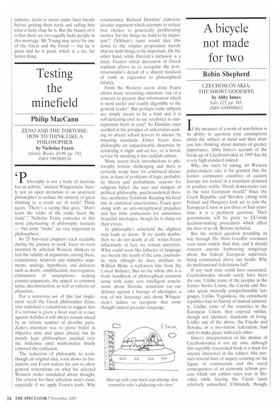Testing the minefield
Philip MacCann
ZENO AND THE TORTOISE: HOW TO THINK LIKE A PHILOSOPHER by Nicholas Fearn Atlantic Books, 19.99, pp. 193, ISBN 1903809134 Philosophy is not a body of doctrine but an activity,' insisted Wittgenstein. Surely not an open invitation to an analytical philosopher to reduce the entirety of great thinking to a crude set of tools? Think again. 'There's a saying that goes, "Don't learn the tricks of the trade, learn the trade",' Nicholas Fearn concedes in this most entertaining of philosophy manuals — 'but some "tricks" are very important to philosophers.'
So 25 fun-sized chapters 'each readable during the journey to work' focus on tools invented by selected Western thinkers to test the validity of arguments, among these, reductionist, relativist and inductive arguments, analogy, hypothesis, and defences such as doubt, simplification, interrogation, elimination of assumptions, seeking counter-arguments, the appeal to common sense, deconstruction, as well as reductio ad absurdum.
For a notorious use of this last implement recall the Greek philosopher Zeno, who exploited a conundrum to suggest that if a tortoise is given a head start in a race against Achilles it will always remain ahead by an infinite number of divisible parts. Zeno's intention was to prove belief in objective time and space absurd, but he merely kept philosophers puzzled over the millennia until mathematics finally removed the confusion.
The reduction of philosophy to tools, though an original idea, soon shows its limitations and Fearn widens his aim to allow general reiterations on what his selected Western males concluded about thought. The criteria for their selection aren't clear, especially if we apply Fearn's tools, Why countenance Richard Dawkins' elaborate circular argument which attempts to reduce free choices to genetically proliferating memes 'for the things we hold to be important'? Ockham's razor would slice this down to the simpler proposition merely that we hold things to be important. On the other hand, while Derrida's inclusion is a must, Fearn's initial discussion of Greek sophism allows us to recognise the poststructuralist's denial of a shared standard of truth as regression to philosophical infancy.
From the Western canon alone Fearn allows many screaming omissions out of a concern to present that information which is most useful and readily digestible to the general reader'. But perhaps some subjects are simply meant to be a bind and it is self-defeating (not to say sciolistic) to misrepresent them as easy? So Dawkins once seethed at the prospect of universities seeking to attract school leavers to science by lowering standards. Either Fearn does philosophy an unpardonable disservice by rendering it slight and ad hoc, or a heroic service by sneaking it into laddish culture.
Many recent lively introductions to philosophy remain challenging and there is certainly scope here for continued discussion, at least of problems of logic, probability theory and probabilism, reasons for religious belief, the uses and dangers of political philosophy, psychoanalytical theories, aesthetics, feminism. Keeping his head low in analytical uncertainties, Fearn goes along with an anti-metaphysical prejudice and has little enthusiasm for sometimes beautiful ideologies, though he is sharp on their errors.
In philosophy's minefield the slightest step leads to doom. 'If we doubt doubts, then we do not doubt at all,writes Fearn fallaciously: in fact, we remain uncertain. What could seem like fallacies of language are merely the result of the easy, journalistic style (though he does attribute to William Blake a well-worn line from the Lyrical Ballads). But on the whole this is a lively handbook of philosophical common sense with some very intelligent conclusions: about Derrida, relativism (as our defence against a barrage of ideologies, a way of not listening) and about Wittgenstein's failure to recognise that some thought indeed precedes language.


















































































 Previous page
Previous page